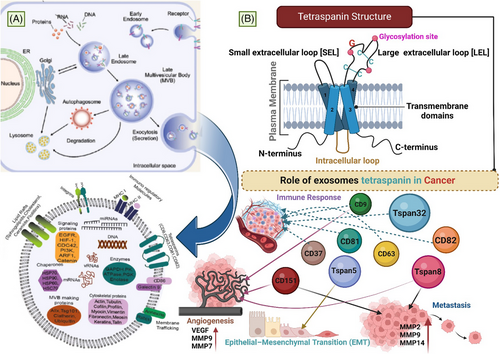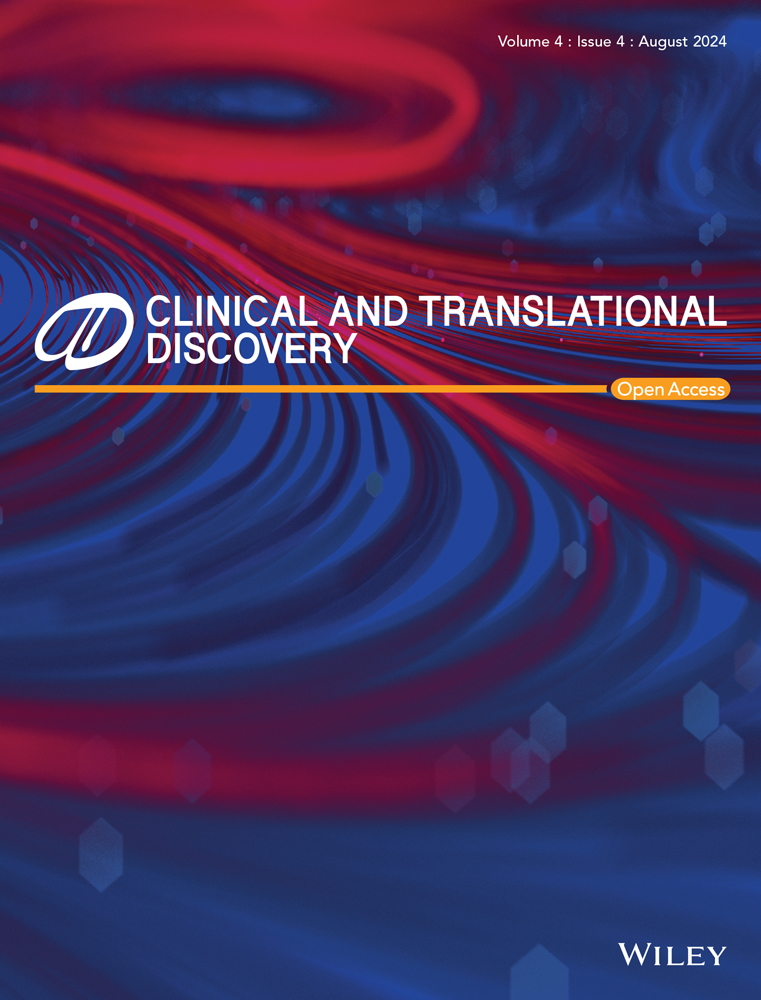Clinical signature of exosomal tetraspanin proteins in cancer
Abstract
Exosomes are nano-scale vesicles involved in intercellular communication and have a significant role in cancer progression. Tetraspanins, are transmembrane proteins enriched in exosomes. These proteins have significant role in exosome biogenesis, cargo sorting,and target-cell interactions, influencing tumor development and therapeutic response. Exosomal tetraspanins, including CD9, CD63, CD81, and Tspan8, contribute to tumor cell proliferation, angiogenesis, extracellular matrix remodelling, immune evasion, and promote metastasis. Their ability to prepare distant organ sites for colonization highlights their role in establishing the premetastatic niche. Expression profiling of exosomal tetraspanin proteins in cancer become a promising diagnostic and prognostic biomarker. Exosomal tetraspanin proteins also be an effective therapeutic target in cancer.This article highlighted impactful role ofexosomal tetraspanin Proteins in Cancer.
Cancer is one of the most found global health challenges. This disease poses significant difficulties due to late diagnosis, inadequate prognostic accuracy, and poor treatment efficacy. These challenges necessitate the development of improved early detection methods, accurate prognostic facilities, and more effective clinical treatment strategies. Extracellular Vesicles (EVs) are being highlighted in recent cancer research, especially in the current decade. Exosomes (a subpopulation of EVs) play a crucial role in inter-cellular communication.1 In cancer research, it leads to a cell-free cancer therapeutic era.2 Usually, these exosomes originate from endosomes. In this process, it transforms into intraluminal vesicles (ILVs) and then develops into multivesicular bodies (MVBs). Finally, plasma membrane and MVBs fusion released exosomes in extracellular space and carry various cargoes like DNA, RNA, proteins, etc. One of the special proteins essential for intercellular communication is known as the tetraspanin protein. Tetraspanins are a family of transmembrane proteins characterized by their four transmembrane domains (TM1–TM4), two extracellular loops (EC1 and EC2), and short intracellular tails that are located on both ends of the protein within the cytoplasm.3 Tetraspanins are considered as ‘molecular facilitators’ in the cell membrane where they directly modulate the assembly of signalling networks responsible for different cellular events such as signalling, loading of selective cargoes and site-specific adhesion. Their participation in cell signalling, adhesion, formation of the exosome, and as immunomodulators prove to be essential in the regulation of cellular events and organization of complex biological processes.4 The tetraspanins such as CD9, CD37, CD53, CD63, CD81, CD82, CD151, and Tspan8 are found to be prominently present in exosomes,5-8 pivotal for membrane domain internalization. Exosomes Tetraspanin proteins have a significant role in cancer progression (Figure 1). Tumor-derived exosomes enriched with CD9 can directly interact with dendritic cells, impairing their antigen-presenting capabilities and hindering the activation of tumor-specific T cells.9 Simultaneously, tetraspanins suppress anti-tumor immunity by hindering T cell activation through CD37 mediated sequestration of signalling molecule within tetraspanin enriched microdomains, disrupting T cell receptor signalling and downstream activation cascades.10 CD63, a common exosome marker, interacts with adaptor proteins for clathrin-dependent transport.11 Tspan8's internalization involves intersectin-2 and dynamin, influencing membrane microdomain rearrangements under stress conditions.12, 13 Tetraspanins are proteins that are involved in cell-to-cell interactions and adhesion. CD9, CD63 and CD81 which are a part of exosomes are involved in exosome-recipient cell interaction. This interaction is important for uptake and the consequent transfer of their contents, which can alter the behaviour of recipient cells. For example, tetraspanin CD151 on exosomes play a part in enhancing exosome internalization by the endothelial cells and causing angiogenesis. Tspan8 containing exosomes may augment the process of angiogenesis, the formation of new blood vessels so vital for tumor development and promote metastasis. These tetraspanins engage with integrins and other signalling receptors on endothelial cells, these lead to proliferation and migration.4 Research revealed that Tspan8-expressing exosomes can induce angiogenesis and promote endothelial cell progenitor maturation, even without additional angiogenic factors. This process is driven by the association of Tspan8 with α4β1 in exosomes, which target endothelial cells and progenitors, regulating angiogenesis-related genes independently of vascular endothelial growth factor and enhancing cell proliferation, migration, and sprouting.13, 14 CD15115 and Tspan816 are found to play a critical role in metastasis progression. Researchers have identified CD151's metastasis-promoting role through an experiment using an anti-CD151 antibody. In a chick embryo model, the antibody was found to inhibit the spread of a human epidermoid carcinoma line by blocking cell migration, without affecting cell adhesion or growth.15 Additionally, high CD151 expression has been associated with poor prognosis in various cancers.17-19 Among the tetraspanins reported to be involved in epithelial-mesenchymal transition (EMT) is Tspan5 which on its own has been found to positively influence EMT,20 whereby epithelial cells are endowed with mesenchymal phenotypes that increase their motile and invasive properties. Exosome-based cancer research needs deep profiling of exosomes, which supports decoding several complications such as exosome heterogeneity, and molecular diversity21. In future, exosomal tetraspanin proteins can become a cutting-edge precision theranostic research tool for cancer.

AUTHOR CONTRIBUTIONS
Asmit Das: Original manuscript writing. Priyanka Saha: Original manuscript writing. Ketki Kalele: Scientific illustration development. Swarup Sonar: Reviewing and Editing.
ACKNOWLEDGEMENTS
Not applicable
CONFLICT OF INTEREST STATEMENT
The authors declare no conflict of interest.
FUNDING INFORMATION
There is no funding for this study.
ETHICS STATEMENTS
Not Applicable.
Open Research
DATA AVAILABILITY STATEMENT
Data sharing does not apply to this article as no datasets were generated or analysed during the current study.




